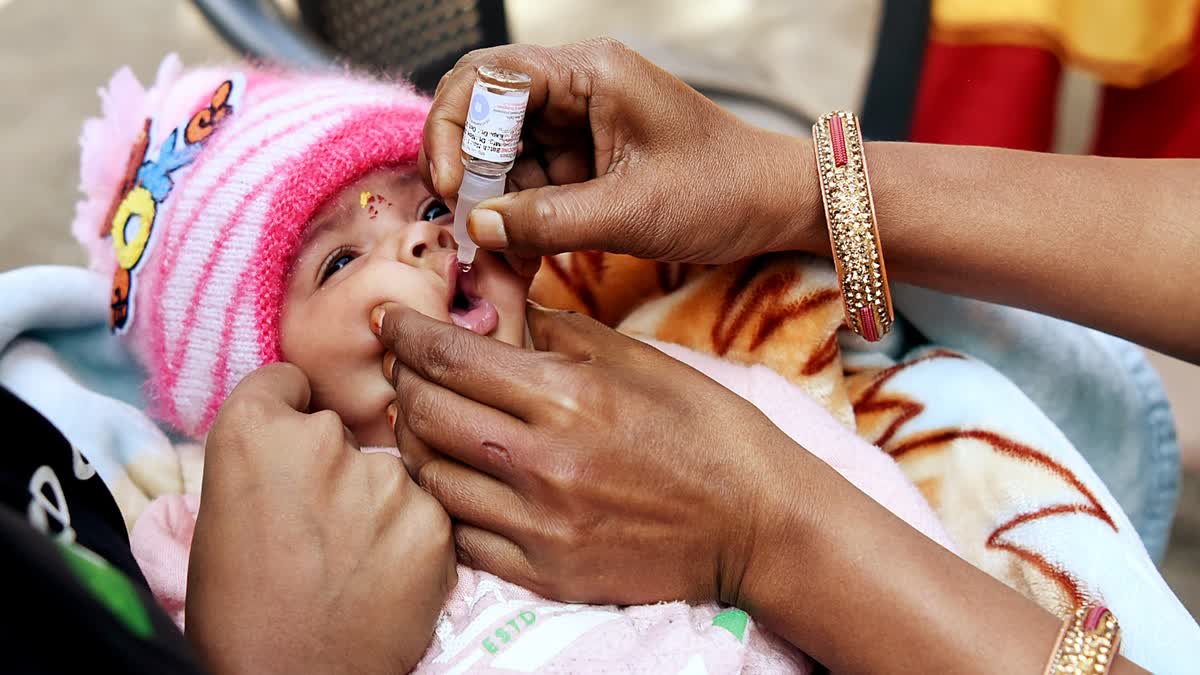New Delhi:Observed annually on October 24, the World Polio Day aims to raise awareness about the importance of polio vaccination to protect every child from this devastating disease. The day also celebrates the many parents, professionals and volunteers whose contributions make polio eradication achievable.
History & Significance
World Polio Day was created and celebrated by Rotary International to commemorate the birthday of Jonas Salk, the medical researcher who led the first team to develop a polio vaccine. In 1955, he created the Inactivated Poliovirus Vaccine. In 1962, Albert Sabin created the Oral Polio Vaccine.
In 1988, the World Health Assembly committed to eradicate the poliovirus, at the time, there were around 3,50,000 cases worldwide. In 2002, WHO European Region was declared polio-free; since then on October 24, the World Polio Day is celebrated worldwide.
The World Polio Day highlights the global efforts to end poliomyelitis (polio) worldwide. The virus is spread from person to person, mainly through the faecal-oral pathway or, less frequently, by a shared object (such as contaminated food or water). It multiplies in the intestine, from where it can enter the nervous system and cause paralysis.
What Is Polio?
In the early 20th century, polio was one of the most feared diseases in industrialized countries, paralysing hundreds of thousands of children every year.
Polio or poliomyelitis, is a highly infectious disease caused by the poliomyelitis virus. It is usually transmitted through the faecal-oral route, typically by ingesting contaminated water or food. It is a highly contagious virus that can lead to paralysis. The symptoms of poliovirus can include fatigue, fever, headache, vomiting, diarrhoea or constipation, sore throat, neck stiffness, pain or tingling sensations in the arms and legs, severe headaches, and sensitivity to light.
Global Initiative
The day is marked with various local, national, and international healthcare organisations, including the World Health Organisation (WHO) and Rotary International, Centres for Disease Control and Prevention (CDC), the United Nations Children’s Fund (UNICEF), Bill & Melinda Gates Foundation and Gavi, the vaccine alliance coming together and conduct several events, campaigns, vaccinations and educational programs to create awareness about the importance of providing vaccines to children to eradicate polio.
GPEI’s Fight Against Polio
The Global Polio Eradication Initiative (GPEI) is a public-private partnership, spearheaded by national governments, WHO, Rotary International, the US Centers for Disease Control and Prevention, UNICEF, the Bill & Melinda Gates Foundation and Gavi, the Vaccine Alliance. Since its launch in 1988, this partnership has helped prevent more than 20 million cases of paralysis, prevented more than 1.5 million childhood deaths and reduced the incidence of wild poliovirus by 99.9 percent, from more than 350,000 cases in more than 125 endemic countries to just two endemic countries in 2024.
For more than three and a half decades, governments and health workers, with support from GPEI, have made unprecedented progress toward the promise of a polio-free world. Recognizing remaining challenges, the GPEI’s Polio Oversight Board (POB) extended the timelines to achieve polio eradication—to the end of 2027 for wild poliovirus and the end of 2029 for type 2 variant poliovirus.
The POB on October 16, 2024 determined that the total funding needs of the extended 2022-2029 strategic period are US$6.9 billion, an increase from the US$4.8 billion projected for the 2022-2026 strategic period.
Polio Status Worldwide
Today, wild poliovirus continues to circulate in only two countries (Afghanistan and Pakistan), and global incidence of polio cases has decreased by 99%. There has also been success in eradicating certain strains of the virus; of the three types of wild polioviruses (WPVs), the last case of type 2 was reported in 1999 and its eradication was declared in September 2015; the most recent case of type 3 dates to November 2012 and this strain was declared as globally eradicated in October 2019.
Oral Polio Vaccines
The launch of Oral Polio Vaccines (OPVs) is considered as one of the most important initiatives with regard to the world's race to end polio. While many infants receive doses of the inactivated polio vaccine (IPV) as part of their routine immunization schedule, OPVs enable public health officials to reach children who were not vaccinated as infants, since they can be administered quickly via a dropper. It is also easy to transport, and is inexpensive.
India Free From Polio
India was declared polio-free in 2014 by the World Health Organisation (WHO) after the last case was reported in 2011. However, a case of polio has been confirmed in a two-year-old child from West Garo Hills district in Meghalaya. The Union Health Ministry, however, said that this is not a case of wild polio, but a case of vaccine-derived polio, in which an infection presents in people with low immunity.
According to the US Centre for Disease Control and Prevention (CDC), in 2023, 524 polio cases across 32 countries were linked to vaccine-derived polio virus.
Read more:
- One More Polio Case Reported In Pakistan; Total Tally Climbs To 22\
- WHO Announces Limited Pauses in Gaza Fighting to Allow for Polio Vaccinations
- Considered 'Burden', Polio-Affected Teen Killed By Drunk Father In Telangana's Medak
